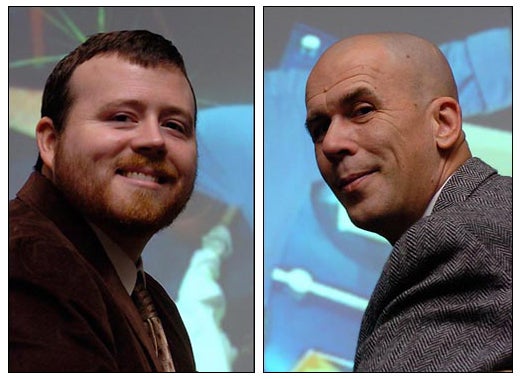POLITICAL HUMOR ‘NO LAUGHING MATTER’
Is there a 'Fey Effect'? You Betcha!
With the U.S. presidential race ramping up, politicians will spend millions on campaigns to enhance their image and affect voters’ choices. And the politicians’ multiple appearances and news interviews give late-night comedians new material to mine.
ECU political science professors Jody Baumgartner and Jonathan “Jay” Morris, along with ECU undergraduate Natasha L. Walth, have determined that humorous portrayals and caricatures of political figures are an important factor in how politicians are perceived among young adults.
The researchers examined young voters’ perceptions of former vice presidential candidate Sarah Palin following impersonations of her by comedian Tina Fey on the popular television program “Saturday Night Live.” Their study, “The Fey Effect: Young Adults, Political Humor, and Perceptions of Sarah Palin in the 2008 Presidential Election Campaign,” was published in the latest issue of Public Opinion Quarterly.
Baumgartner said they simply got lucky on the timing of the “American Values Survey” they were conducting at public universities across the country. By November 2007, the ECU researchers had 10,343 students, ages 18 to 24, who agreed to participate. Those students were asked to complete a series of surveys beginning in December 2007 and continuing through November 2008. Ultimately, 1,755 students completed all six.
The first and second surveys had identical questions that measured views of Sarah Palin, John McCain, Joe Biden and Barack Obama. Baumgartner said the researchers lucked out when “SNL” aired its first skit featuring Tina Fey’s impersonation of Palin on Sept. 13, 2008, because it appeared after the first wave of surveys had been fielded. A second skit aired two weeks later. The vice presidential debate took place Oct. 2, and the “SNL” spoof of that aired two days later. The researchers’ second survey was fielded Oct. 24-Nov. 2. And “SNL” aired more skits lampooning Palin.
Baumgartner said they weren’t looking specifically for this topic, but “this is the type of research that we do. The survey questions that we asked – we asked the right questions at the right time.”
He said the Palin questions were part of a larger survey on the college students’ knowledge of all the candidates and their political views.
“We knew what we were going to find (as the survey results came in). The pleasant surprise was that we had taken a survey before and one after the vice presidential debate. Absolutely consistent with previous research – if comedians make fun of someone the perception on that person is going to go down,” Baumgartner said.
In the weeks following her appearance in the vice-presidential debate, overall approval for John McCain’s pick of Palin dropped from 40 to 31 percent in the researchers’ sample (taken between the first and second waves survey questions), while disapproval increased from 39 to 55 percent, their study reports.
This was not the first time Baumgartner and Morris teamed up to study young voters. In 2006, they reported their research showed college students who watched the satirical TV program, “The Daily Show,” were more skeptical and knowledgeable about politics and media.
“We do know a lot of young people watch political comedy – late night TV in particular,” Baumgartner said. “And we know some or many of them are getting their understanding of politics from this. You have to assume it’s playing a fairly important role (in their decision on candidates).”
Baumgartner said he doesn’t think viewing Fey’s impersonation of Palin changed people’s vote. “Political humor is just a drop in the bucket,” he said. “People form their opinions from many various sources.”
Their study noted that “SNL” has been doing parodies of presidential candidates since its inaugural season in 1975.
The political party that a voter is most connected to proves to be the most important factor in their candidate selection, Baumgartner said.
“We know (political humor) will change the way the person thinks about the candidate and it may change the vote. But it’s not necessarily the same thing – changing an opinion and changing a vote. You can assume a changed opinion might have an effect,” he said.
“Political humor seems to have more effect on the less informed citizen,” Baumgartner said. “The more informed citizen probably already has an opinion formed or is on its way to being there.”
